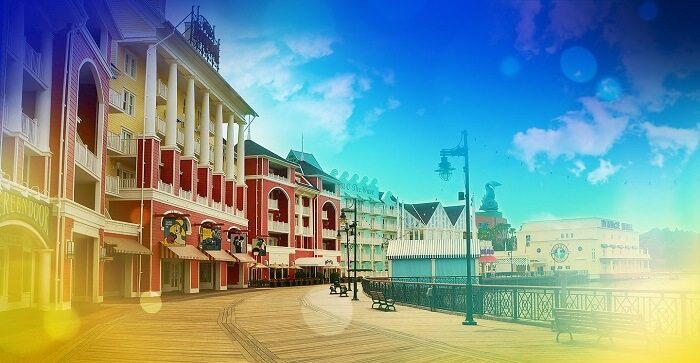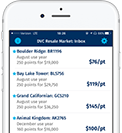Why is the Resale Value of Disney Vacation Club so Much Stronger than other Timeshares?

Many people’s first reaction to why Disney Vacation Club (DVC) carries a higher resale value is perhaps the name itself. While the Disney brand is undeniably a powerhouse, the name itself doesn’t tell the entire story as to why the resale value of DVC is so strong. For example, a consumer could just as easily rent a hotel room from Disney, which still carries the Disney brand name.
In 2016, Sharket.com, a timeshare market research site, ranked the top 25 timeshares out of 1,400 resorts according to a “saleability score”, which was formulated using volume of sales and sales price. The top 6 were Disney Vacation Club resorts (Saratoga Springs, Bay Lake Tower, Animal Kingdom, Old Key West, Boardwalk and Beach Club). According to Bob Schmidt, Sharket’s Chief Data Officer, “Disney Vacation Club timeshares continue to enjoy a high number of sales and high median prices compared to almost any other resort.”

Economic Principle of Substitution
In an interview with the Orlando Sentinel last year, I was asked this very question of why the resale of DVC remains strong, especially compared to other timeshares. The response I put forth was the economic principle of substitution. This principle states that when several similar goods or services are available, the one with the lowest price will attract the greatest demand. The reason many timeshares have a poor resale value is that the dues / maintenance fees exceed the rental rate. The timeshare inventory a developer has can be used for rental revenue, and renting that inventory can be a critical component of a developer’s profitability. A developer may have inventory for various reasons: yet to be sold, foreclosed on, purchased back or reclaimed from the Member(s) due to non-use. If the rooms cannot command high revenue the developer may have to discount the rooms. If and when those rental prices become lower than the costs of the annual dues or maintenance fees, the timeshare is essentially worthless, because the educated consumer is not going to pay for the timeshare when they can rent the room for less than the costs of the annual dues associated with the timeshare.
Disney Timeshares are Different
Unlike many others in the timeshare industry Disney doesn’t have to discount rooms nearly as much. If you are going to Disney World there really is no substitute for staying on property; as the three golden rules of real estate affirm, “location, location and location”. The added convenience of already staying inside the over 40 square mile property is significant (approximately the same size as the city of San Francisco). Aside from the natural convenience of staying on property with all the various transportation offerings, Disney also adds additional benefits such as Magical Express to and from the Airport, ability to book meal plans and farther out booking windows for their FastPass system. While Disneyland doesn’t have the luxury of being 40 square miles, it too offers compelling benefits to staying on property that cannot be matched. At Grand Californian there is a special entrance for Disney’s Californian Adventure and you can walk directly into Downtown Disney. Additionally, even the non-park DVC Resorts offer amenities, theming and entertainment that are uniquely Disney. Since the costs of Disney rooms remain high, DVC truly provides value in being a lower cost alternative, and thus proving the principal of substitution.

Lets Do the Math
To show the value of DVC we will demonstrate a comparison of resort costs using DVC points vs. renting the same Disney room on cash. For this example, we are going to use a common room type such as a standard view studio being booked for November 15th, 2017 since it is a moderate time of year in terms of guest demand for most DVC locations. This comparison will show the estimated costs using points vs. cash for each of the 13 DVC Resorts.
To understand the cost of a night booked with DVC points, we will need to first understand the cost per point per year for each resort. To do that we will take the costs of the annual dues per point and then add to that the typical resale purchase price divided by the years left on the deed. For example, Animal Kingdom’s cost per point per year would be $6.59/pt. (annual dues for 2017) + $85 (typical resale cost per point) divided by 40 (years left on the deed). This would result in a total of $8.72/pt. per yr. for Animal Kingdom based on 2017 data. For a breakdown of all the resorts please see the chart from the blog, Best Economical DVC Resort to Purchase: Spring 2017. With a cost per point per year for each DVC Resort, we can then multiply that number times the number of points to stay in that room to get a projected cost using DVC.
The chart below shows a one-night comparison for all 13 Disney Vacation Club Resorts when using DVC points vs. cash.
| Resort | Theoretical Cost Using Points* | Cash Rate** | Savings Using DVC |
| Animal Kingdom | $105 | $404 | 74% |
| Aulani^ | $177 | $514 | 66% |
| Bay Lake Tower | $126 | $501 | 75% |
| Beach Club | $158 | $438 | 64% |
| Boardwalk | $104 | $438 | 76% |
| Grand Californian^^ | $181 | $541 | 67% |
| Grand Floridian# | $189 | $738 | 74% |
| Hilton Head | $98 | $133 | 26% |
| Old Key West | $94 | $361 | 74% |
| Polynesian | $164 | $526 | 69% |
| Saratoga Springs | $94 | $361 | 74% |
| Vero Beach | $136 | $198 | 31% |
| WL: Boulder Ridge | $149 | $437 | 66% |
*Estimated by multiplying the estimated cost per pt. per yr. of owning that respected resort by the no. of pts. per night based on 2017 resale data **Pre-tax rental rates provided by disneyworld.disney.go.com on 4/5/2017 for booking for 11/15/2017 unless stated otherwise ^Garden view studio used for comparison due to no std. veiw rooms available on cash ^^Standard view studio compared to standard view hotel room due to no studios available on cash #Lake view studio was compared to outer building lake view hotel room for 12/17/17 due to low availability of cash rates
The chart above shows savings as they would stand in 2017. It is important to note that the chart does not take into account taxes on the cash rates (typically ranging from 7% to 13.25% depending on the state), interest if financing (typically ranging from 10% to 14%) and assumptions regarding rental rate inflation, annual dues inflation and possible room discounts for longer lengths of stay. For those that would like to explore long term savings with inflationary and room discount assumptions please see our blog, The Long Term Savings of Disney Vacation Club. That blog includes an attached spreadsheet model that allows the user to provide assumptions regarding inflationary rates and possible room discounts.
The chart above shows that across the board, Disney Vacation Club provides a significant value for staying at DVC Resorts. In contrast to many other timeshares, when accounting for the price and the annual dues of DVC, the savings is still substantial. In fact, the average savings when averaging all 13 DVC resorts from the example used is 64%. Additionally, the savings DVC provides makes it an excellent substitute for those looking to stay at Disney premium resorts. For this reason, DVC continues to hold a strong resale value as its Members continue to realize the savings.








Comments
I think this is bang on the money. However, for a true savings figure, I calculated against the cost of renting points. Also for a UK visitor, they have had some very good deals on, with discounted rooms and free dining. These have gine up in price generally for 2018 though, by as much as 25%. However, the savings from being a DVC owner (I bought resale via DVC Resale market and after renting out last years’ banked points my SSR contract cost me $64 a point, compared to Disney price of $145 a point (!)) DVC ownership still comes out very much on top on the ‘economic principle of substutution’.
That’s a great deal. I have 1225 points at 8 resorts and use every last one. I’ve never had to rent our points, but I understand when someone cannot use all of their points, and must do so. However I also realize that when a rental company is giving you $13 for each of your points, you have to subtract what you are actually paying for each point per year (price plus dues) which usually leaves only about $5/pt you’re making, not $13/pt. For example, I thought that I’d make some bucks renting my 125 VGF points at $13/pt. Sure, I’d be getting $1625 but I paid $1076.25 for that years pointo at $8.61pp ($2.90/pt/yr + $5.71/pt dues). I’d only be making $548.75 or $4.39/pt and its worth so much more to me than that. So I banked the points and booked two room for the next year and took our friends. But from the numbers, Saratoga Springs is the most economical resort to own at, which I do not. So here’s to many years of enjoyment for you and yours.